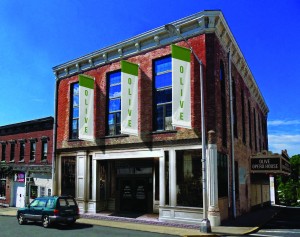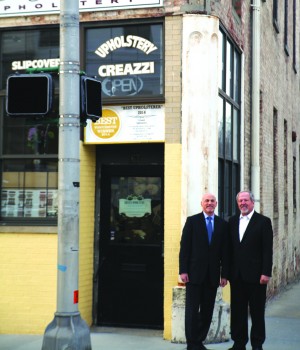Ossining residents Dennis Kirby and Wayne Spector share a vision for their village”™s historic downtown and its long-awaited revitalization.
Co-founders of Grow Ossining, a community investment initiative that last year raised $10,000 in seed money from 100 local residents and business owners to launch what was then a still unformed commercial venture, the men have anchored their vision in a 19th-century brick building that stands at the corner of downtown Central Avenue and Brandreth Street, just around the corner from Ossining”™s faded Main Street retail corridor.
A three-level commercial building that once housed a garment factory”™s rows of sewing machines and is occupied by upholstery and embroidery shops on the ground floor and artist lofts upstairs, it originally was the Olive Opera House. Built in 1874, it replaced the first, gaslight-illumined opera hall that opened in 1865 on the site and was destroyed by fire nine years later. Kirby and Spector think a restored Olive Opera House, with a downstairs restaurant and catering business that profits from serving arts audiences and wedding and party guests at a nonprofit performing arts and events center upstairs, could be the cultural “sparkplug” that Spector said is needed to draw restaurateurs, other entrepreneurs and visitors to their riverfront village.
“Ossining needs something,” said Spector, a partner at Cohn & Spector Esqs. in White Plains and attorney for the town of Ossining. “Pleasantville has the Burns Center. Tarrytown has the Music Hall. Port Chester has the Capitol” theater. “Ossining needs something to bring people in. We think this is that something.”
Already, the Westchester Collaborative Theater, a nonprofit performing group in Ossining that includes playwrights, actors and directors in its ranks, has expressed interest in making the Olive Opera House its new downtown home.
“Restorations of opera houses seem to a trend nationwide,” Spector said.
That a spark is needed to reanimate the commercial heart of the village was evident in a walk up and down Main Street in search of a coffee shop just after 6 p.m. on a recent weekday. Kirby and Spector stopped at the doors of a few cafes and restaurants on the street; all were closed. At last we found an open door and cups of coffee at a Main Street bar popular with Ossining”™s Hispanic residents. The quiet downtown showed no signs of an after-work social life for the millennials, empty nesters and other downtown dwellers whom the village aims to attract.
“The government can”™t do it alone,” said Kirby, a semi-retired human resources executive and former facilities manager at PepsiCo Inc. who serves on the town of Ossining planning board. “And the government even has problems when partnering with people” in the public-private partnerships that Ossining and other Westchester communities have turned to in recent years to stimulate economic redevelopment.
Government is not involved in the community investment fund, for which Kirby and Spector have formed Grow Ossining Management LLC. (The limited liability company will be a partner in the Grow Ossining limited partnership whose formation is expected to be completed this spring.) “We”™re keeping politics out of this,” said Spector. “It really is a grassroots effort.”
As requested by the current owner of the Central Avenue building, Kirby and Spector developed a detailed three-year business plan for the community-based enterprise. Total building acquisition costs have been estimated at approximately $1 million, while renovations needed to convert the space for restaurant and performance and event uses have been estimated at $1.55 million. Kirby and Spector have made a $975,000 purchase offer for the building where long-departed vaudeville troupers have left their names on a cellar wall, but said a final sale price is being negotiated.

- Grow Ossining co-founders Wayne Spector, left, and Dennis Kirby in front of the former Olive Opera House. Photo by John Golden
In late February, Grow Ossining”™s prime movers raised the $50,000 required by the building owner as a refundable deposit on the pending purchase. As of March 18, Grow Ossining had raised slightly more than $60,000 toward its goal.
“It was a lot harder to raise the $10,000 than it was to raise the $60,000,” Spector said. Before the Olive Opera House became the focus of the community effort, “They had nothing to grasp. It opened the proverbial door” for local investment. “It”™s almost like before we were all dressed up with nowhere to go, and now we have a party to go to.”
But before any parties can be held at a new Olive Opera House, Grow Ossining must raise at least $300,000 by June 15 in order to sign a formal contact for the deal. The co-founders said they must raise a total of $1 million by Feb. 29.
The co-founders want to attract 500 investors “with skin in the game,” said Spector. He said he expects investors to contribute $2,000 to $3,000 on average and $25,000 to $30,000 on the high end. Investment units in the limited partnership will be priced at $250.
“Like any other investment, there is risk, but the risk is going to be minimal,” Spector said.
To limit the partnership”™s regulatory filing requirements, investments in the Ossining project can be made only by New York state residents, said Kirby.
For investors, “The locavesting concept, this is something that you can actually reach out and touch. Back when this opera house was built, that”™s how investment worked,” said Kirby.
Spector said he thinks the Olive Opera House venture, “if it does take off, has the ability to change the paradigm ”” how people look at this village. I think it could become a model for other struggling downtowns that have communities as engaged as we are.”
The co-founders said Grow Ossining could pursue other investment ventures in the future, such as a downtown business incubator.
“We”™re walking before we run,” said Kirby. “But if this project is successful, that would be the beginning.”






















